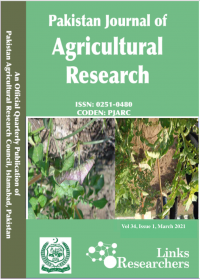Effectiveness of Bio-Activated Zinc Coated Urea (Engro Zabardast Urea) for Growth, Yield, and Biochemical Parameters of Rice Crop (Oryza sativa L.)
Effectiveness of Bio-Activated Zinc Coated Urea (Engro Zabardast Urea) for Growth, Yield, and Biochemical Parameters of Rice Crop (Oryza sativa L.)
Muhammad Hasnain1, Qudsia Nazir2, Ifra Saleem2*, Syed Shahid Hussain Shah1, Muhammad Asif Ali1 and Noor ul Ain3
ABSTRACT
Zinc (Zn) bio-fortification is an effective, low-cost in grains of staple food like rice and wheat and possible choice to reduce/decrease the Zn deficiency among humans of poor world. Around the globe main/basic reasons of Zn deficiency are intensive agriculture and ignorance to micronutrient fertilization. Soils with less organic matter (OM), high in pH and calcareousness contribute in Zn deficiency. Moreover, efficiency of zinc (Zn) in soils is usually very little due to fixation of Zn in the soil matrix. So, a study was executed to find out the combined effects of urea coated with bio-augmented Zn 1% (Engro zabardast urea (EZU)-a fertilizer source of N and Zn) on rice growth, yield, and Zn bio- fortification. The applied treatment (EZU) was compared with control (recommended N, P and K) and ZnSO4 + urea and P, K. Results clearly indicated that the application of EZU showed improved Zn concentration significantly in rice grains, which were maximum (66.8%) and minimum (55.3%) increase was in rice observed as compared to where no (Zn) was applied (in control) at Faisalabad and Chiniot (FSD and CHT), respectively. EZU also showed improved results of Zn contents in grains as compare to the treatment where ZnSO4 and urea was applied separately. On the other hand, with application of EZU, agronomic parameters including straw and grains yield, and panicle length were also improved significantly (2.7, 18.7 and 16.4%, respectively), as compared to urea and ZnSO4 application separately. Therefore, it was concluded that the application of EZU played role as a slow-release fertilizer that improved Zn bio fortification in rice grains and Zn needs of humans will be fulfilled by consumption of zinc (Zn) enrich grains of rice.
To share on other social networks, click on any share button. What are these?






